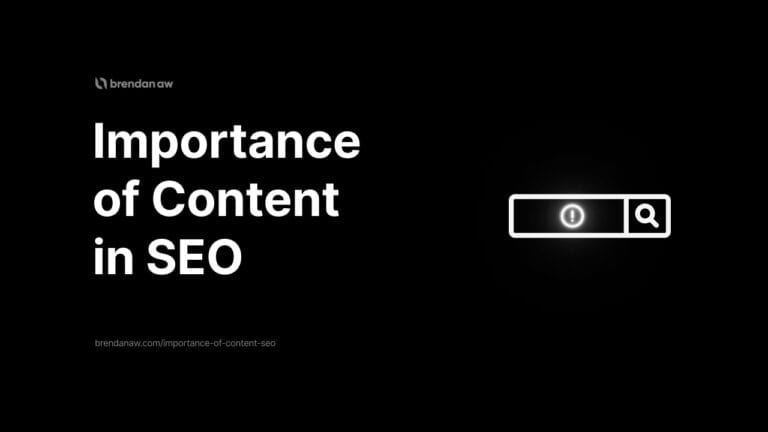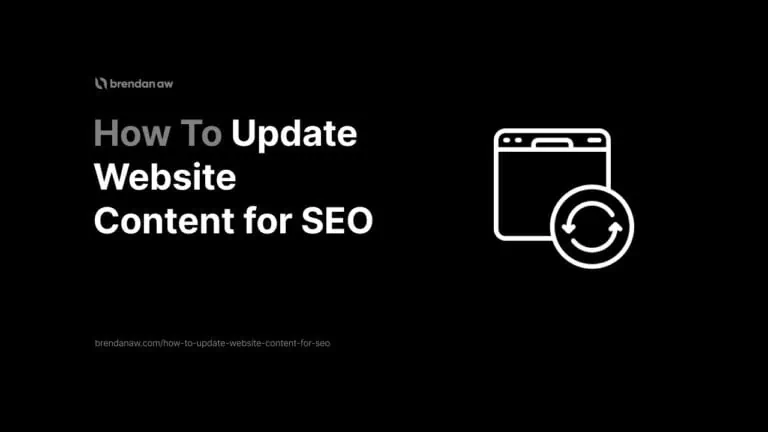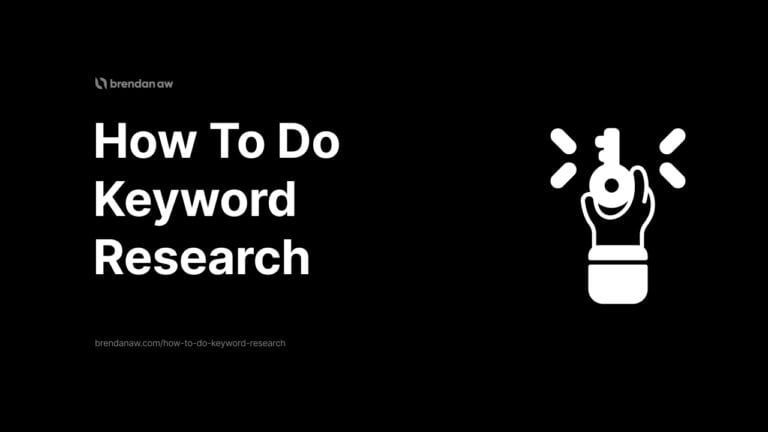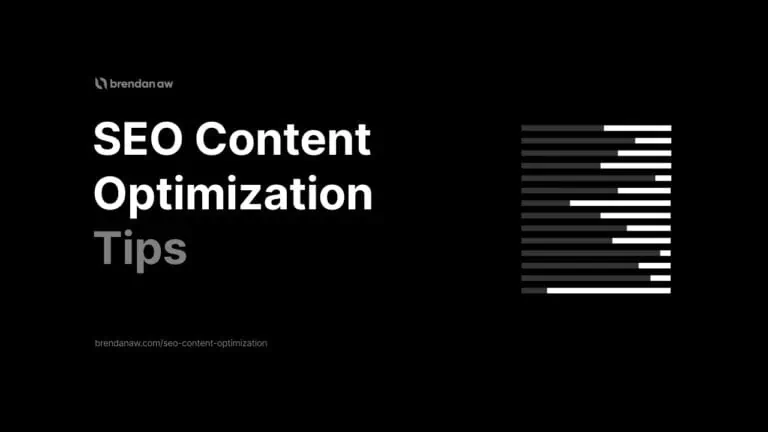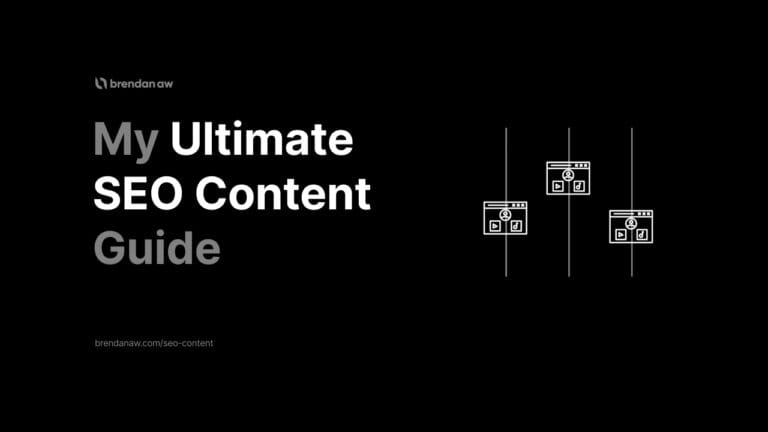Is there really a need to learn the difference when they are both SEO strategies anyway?
Yes, because to make maximize every SEO aspect, need to understand in depth what they are, how they work together, and what sets them apart.
And if you have a website to run your creator business like me, this is something you should know.
In this content SEO vs Technical SEO breakdown, I’ll go over:
- What exactly each is
- Their key differences
- Their connection
- Frequently asked questions
What Is Content SEO?
Content SEO is creating optimized content to attract web crawlers to your pages and effectively rank them higher. These can include text, video, audio, and even the layout of your content.
This aspect of SEO is where your words actually matter. Google measures content quality by the brand’s or the author’s E-E-A-T.
- Experience
- Expertise
- Authority
- Trustworthiness
Aside from the quality of actual content, here are major factors to keep in mind:
- Keywords: Does it utilize proper keywords in its URLs, Titles, Headers, Body, and everywhere else?
- Content Organization: Is content arranged in a way that makes sense for both users and crawlers?
- Link-building: Does it have enough internal and external links?
These four can easily cover everything that represents content SEO.
What Is Technical SEO?
Technical SEO is the process of optimizing your website internals for better crawlability and indexibility. It’s called technical because it’s got nothing to do with the content but the infrastructure on the backend.
The basic technical SEO elements would be:
- Robots.txt
- Structured Data
- Sitemaps
- Site Architecture
There are a lot more factors to consider in technical SEO: optimizing page speed, fixing broken links, making the website mobile-friendly, maintaining a single domain, and more.
A technical SEO checklist should get you through everything.
If you’re a job seeker sending an application, technical SEO is akin to:
- Organizing your portfolio
- Removing unnecessary pages
- Preparing your CV
Google is that agent who wants applications in a specific format or you can take the risk of it being mis-assessed.
It is SEO’s job to minimize those risks.
You have to make sure your future employer can understand your intent and can navigate your portfolio before they actually consider what’s in it.
What Is the Difference Between Content SEO and Technical SEO?
Here are the six key differences between content SEO and technical SEO:
- Driving Force or Focus
- Role in Search Engine Indexing Requirements
- Google Ranking Factor Coverage
- Link Building
- Keyword Optimization
- Performance Metrics
1. Driving Force or Focus
Although rankings and authoritativeness adhere to technical requirements to a certain degree, they should never lose their purpose, wouldn’t you agree?
Content SEO should be driven by providing user satisfaction above all.
This means providing high-quality, relevant, and valuable content that satisfies the exact search intent.
Technical SEO focuses on optimizing the backend structure of your website to make it more crawlable and indexable.
This would include things like:
- URL structure
- Site architecture
- Site speed
2. Role in Search Engine Indexing Requirements
Content SEO satisfies the “What” while Technical SEO satisfies the “How”
Imagine your website as a hotel.
When you have great content, that means you have top-notch accommodations and quality services. That is WHAT you sell and that is your content SEO.
Now, your hotel is weirdly placed on the side of a mountain, away from the population’s eyes.
So, HOW do you start establishing the hotel’s existence?
Technical SEO aims to solve that problem.
It will…
- Build proper infrastructure to lead customers there
- Organize transportation
- Ensure the amenities are functioning well to impress inspectors for a good rating
- Focus on great customer service to get word-of-mouth promotions
All to ensure that its existence is officially recognized and easily discovered.
Not many individual creator site owners will dedicate time to technical SEO.
But get it right from the start and reap the rewards.
3. Google Ranking Factor Coverage
Google has been updating its algorithm regularly, and it’s been hard to monitor every minor shift in ranking factors. But, SEO experts listed 200 generally accepted ranking factors that are used to anchor strategies through the years.
SEO content affects factors like:
- Trustworthiness
- User engagement
- High–quality content factors
It dominates the top spots on Google’s top ranking factors.
Technical SEO influences stuff like:
- Mobile-friendliness
- Page speed
- Site security
- Schema mark-ups
Combined with other technical factors…
These make up roughly a third of Google’s ranking factors.
Together that’s about 80% percent coverage on all ranking factors.
That’s a lot of birds for two stones.
Technical SEO and quality content leave only a small portion of other algorithm rules for other factors.
Get those two right…
And you’ll be one your way to SEO success.
4. Link Building
Content SEO takes the driver’s seat when it comes to link building.
Incorporating internal links throughout your content ensures optimal link juice flow which results in:
- Topical authority
- Better user navigation experience
- Increased credibility
All of which improve your search engine ratings.
Technical SEO… technically has no direct involvement with link building.
But it’s crucial for driving user engagement and improving online visibility for your website through a more comprehensive link assessment.
5. Keyword Optimization
Keyword optimization is one of the foundational aspects of content SEO as it is how Google will know what your page is about.
This involves placing them strategically in your title tag, meta descriptions, and body.
And like link building, Technical SEO has no direct relation with keyword optimization.
But having a well-optimized site will ensure that search engines can effectively make sense of its keywords.
6. Performance Metrics
Both content SEO and technical SEO use completely different metrics to assess their performance.
In content SEO, you’ll want to know stuff like:
- What types of content perform best
- How users engage with your content
- What keywords you are ranking for
But technical SEO is more concerned with… well technical (seriously, no pun intended again) issues that are impacting your site’s overall performance and search engine rankings.
These will metrics are things like:
- Page load times
- 404 errors
- Mobile optimization scores
Why Is Content SEO Important?
The importance of Content SEO is the foundation of getting visibility online.
It is what your users consume and what search engines need to understand what your site is about.
Without a proper strategy… you are just wasting precious resources.
It takes time to see the impact of Content SEO…
So it pays to make smart moves early.
The latest stats puts Google’s daily searches at 8.5 billion hits.
You need content to answer those queries to get a chance at ranking.
Save yourself by reading my SEO copywriting checklist to please both humans and search engines so you rank higher.
Why Is Technical SEO Important?
Technical SEO sparks the connection between search engine crawlers and your awesome content.
Search engines need to know what you offer so they can place you in SERPs accordingly.
Back to the hotel example I mentioned above.
You can have the best damn hotel on Earth, but what if there’s no way to get to it?
Google is smart. But you must provide information it understands.
How else can their crawlers know if you don’t provide proper directions?
Technical SEO does not fall into the make-or-break category of SEO…
And a competent webmaster can fix your issues.
But that doesn’t mean you can undermine the role it plays.
Technical SEO isn’t as sexy as content SEO, but you need it so that your content is effectively delivered to your audience.
SEO Content Vs Technical, SEO On-page vs Off-page: What’s the Connection?
SEO strategies are categorized with practicality.
On-page SEO executes tactics directly inside a website to improve search rankings.
Off-page SEO focuses on measures outside the official website like promotion of link-building and encouraging visits from another platform’s initiative.
Definitions are pretty straightforward but there can be overlaps.
Content SEO can be a mix of both on-page and off-page strategies (like updating past articles) while technical SEO is exclusively on-page.
Content SEO vs Technical SEO Maintenance
If your website is a house, having technical issues means having some rooms locked out, a blackout, or a weak water supply.
Not doing repairs right away stops visitors from accessing every area and using normal functions.
It’s unfortunate and lowers the chances of high appreciation of the house’s actual value.
As for content SEO, content should be kept evergreen as much as possible to lessen the need for repair.
Depending on the nature of your website, you might need to check the soundness, accuracy, and relevance of your content more frequently than others.
For both SEO elements, an update from Google should prompt a review of the existing strategies in place.
Not all updates have major effects but once piled up, it can cause an entire shift in best practices.
Content SEO vs Technical SEO (FAQs)
Should I Prioritize Content SEO or Technical SEO For My Website?
Your website needs both to climb the rankings and I want to say you need both SEO strategies equally.
But if you want to know what to prioritize, it depends on your previous strategies, your website’s current status, and what you want to achieve.
Do an SEO audit first.
Know your starting point.
From there, you can accurately tell where your website stands and what you need to improve. It’s an endless cycle of updating and upgrading.
But having a strong technical SEO foundation is like owning a top-calibrated catapult and content SEO is the ammunition.
Your competitor can publish the same quality of content but if they are lagging behind on technical SEO, your content will definitely go farther.
It’s a catapult going against a slingshot.
Your competitor knows this too so everyone strives to cover technicalities. It is your responsibility to not bring a slingshot in a ballistic fight.
So, it’s not really a question of advantage but avoiding a handicap.
Who Handles Technical SEO? Content Marketing?
While both strategies should be under an SEO specialist’s supervision, responsibility over technical SEO weighs heavily on the web developer.
As for content SEO, it will be handled by the collective effort of writers, editors, designers, and managers.
Since companies have allotted budgets for this, they can assign people based on expertise.
Can Content SEO and Technical SEO Be Done by One Person?
Yes. Absolutely. Multiple people get to work on different aspects of SEO in companies for better efficiency. But, you can very well do it yourself. Like me.
There are many AI SEO tools that can assist you with this.
How Long Does It Take To See a Change in Ranking With Content SEO and Technical SEO?
There is no definite answer to this because there are too many variables. It can take a few days, weeks, or even months. If you’re still not ranking after a year, you probably didn’t implement either correctly.
Content SEO vs Technical SEO, which affects Google’s Algorithms More?
Technical SEO serves as the gateway to put your website on the radar. And content SEO is your marketing strategy.
Both technical and content SEO is picked by Google’s algorithm. According to Backlinko’s study on the top 200 ranking factors, the most important ones are content SEO elements.
Does Technical SEO or Content SEO Require More Investment?
You have to invest in both, obviously. But generally, content SEO will need more investment in the long run due to the cost of hiring writers, editors, and SEO specialists. Technical SEO services are usually project-based with a lump-sum payment.
Does Technical SEO Require Coding Skills?
No, not necessarily. But you can come across basic codes for CSS, HTML, and other programming languages so having some background makes it easier.
Robots.txt, sitemaps, and SSL certificates do sound complicated but generator tools are available online to help you clear Google’s technical requirements with much less effort.
Easy peasy.
Can a Website Exist Without Technical SEO and Content SEO?
Yes, it can. You can build a website for the sake of having one. Just don’t assume it’ll get ranked well.
Without technical SEO, Google will not be able to find your website or content. Without content SEO, Google will not be able to understand what your content is about.
Not to worry though, if you want to improve it at a later time but missed a good start. There are other strategies that exist outside of SEO, content marketing being one of the more popular alternatives.
Not using SEO strategies rids of the opportunity that search engines give when they drop hints and hand out guidelines that directly influence rankings.
Can Technical and Content SEO Be Outsourced to SEO Services?
Yes, both technical and content SEO can be outsourced. Content SEO can usually be performed by individual writers who are proficient with SEO best practices, but you might need a developer to optimize your technical SEO performance.
You can also engage agencies, but most will simply just outsource your outsourcing and charge you a hefty middleman fee.
What Role Do Google’s Core Web Vitals Play in Technical SEO?
Google’s Core Web Vitals evaluate key on-site user experiences metrics like loading speed, interactivity, and visual stability and assigns individual scores.
It’s one of the key Technical SEO factors that Google takes into account when ranking your website.
How Do I Know If My Site Has a Good Balance of Technical and Content SEO?
Glad you asked. A well-balanced website with strong technical and content SEO typically has the following characteristics:
• Fast load speeds
• Is mobile responsive
• Great website architecture for both users and web crawlers
• Has valuable content that isn’t 100% written with AI
• Proper inclusion of on-page elements (semantic keywords, word count, title tag, meta description, and headers)
You can use a tool like NeuronWriter for optimizing content and PageSpeed Insights or GTMetrix for analyzing technical issues.
To Sum Up
Great content with sloppy technical SEO is like a treasure chest thrown into the ocean. Sure, someday someone “might” find the treasure but what are the chances?
Subsequently, technical SEO with no substantial content is like a treasure chest placed on a pedestal but only contains a few copper coins when opened.
While technical and content SEO touch on different aspects of a website, they both aim to push you up on Google’s SERPs.
Great SEO comes from both strategies working together.
That’s it!
Hope you liked my explanation of the differences between technical SEO vs content SEO.
Related Reading: The Ultimate SEO Content Brief: 16 Items You Must Include



